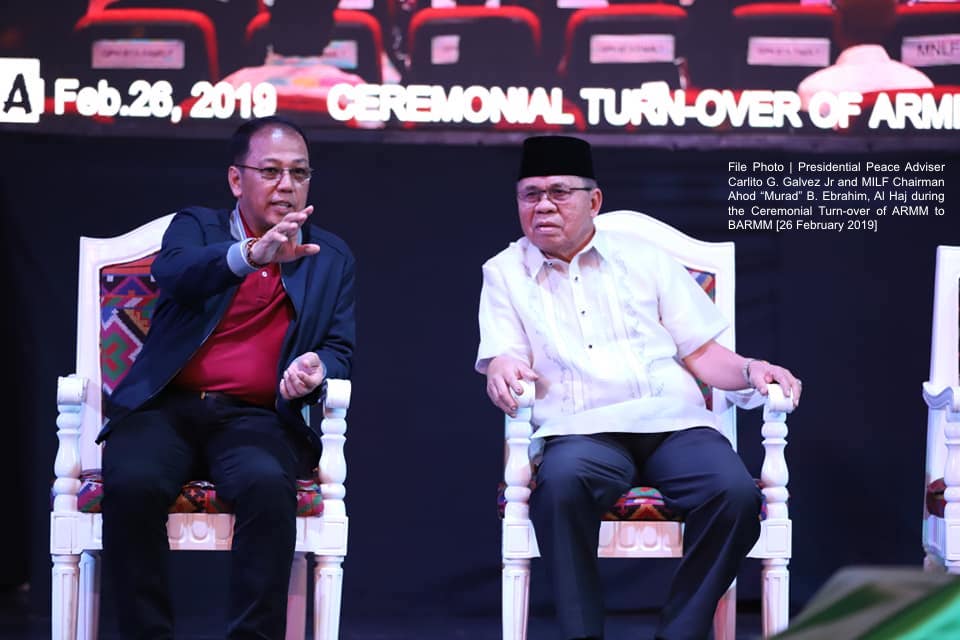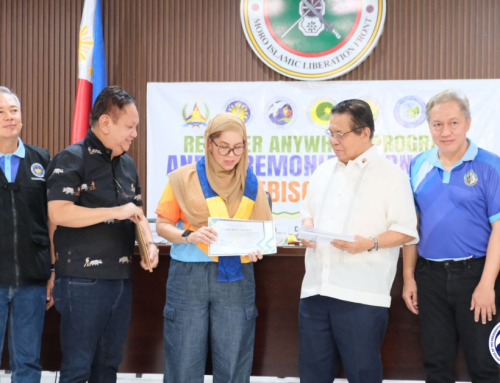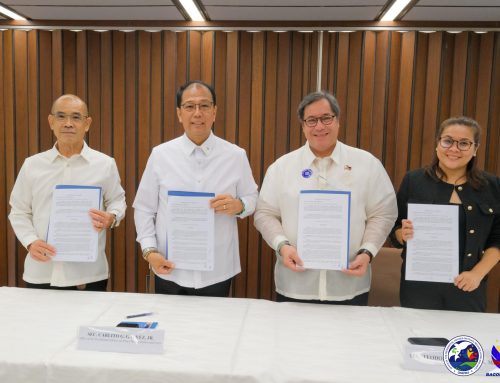PASIG CITY — The implementation of the political and normalization tracks of the Comprehensive Agreement on the Bangsamoro (CAB) is anchored on “jointness between the national government, the BARMM (Bangsamoro Autonomous Region in Muslim Mindanao), and the MILF.”
This was underscored by Office of the Presidential Adviser on the Peace Process’ (OPAPP) Chief-of-Staff and Spokesperson Assistant Secretary Atty. Wilben M. Mayor, during the ‘Tapatan sa Aristocrat’ on Monday, July 5.
“We work together, and that despite the pandemic that we are experiencing now, we will see to it that the deliverables on the part of the national government will be complied. The marching order of President [Rodrigo Duterte] will be complied,” said Mayor, who is the vice chair of the GPH Peace Implementing Panel (GPIP) for the GPH-MILF peace accord.
In his presentation, he highlighted the major gains achieved in the Bangsamoro peace process, particularly the initiatives being carried out by OPAPP in collaboration with its institutional partners under the political and the normalization tracks of the CAB.
Political Track Updates
Under the political track, Mayor cited the approval of the Bangsamoro Development Plan, and the operationalization of the Intergovernmental Relations Body and other IGR mechanisms, including the Intergovernmental Fiscal Policy Board (IFPB), Joint Body for the Zones of Joint Cooperation (JBZJC), Intergovernmental Infrastructure Development Board (IIDB), Intergovernmental Energy Board (IEB), and Council of Leaders.
The Bangsamoro Transition Authority (BTA) has enacted three priority codes, which include the Administrative Code, Civil Service Code and Education Code, as well as its Bangsamoro Development Plan (BDP).
BARMM Spokesperson and Minister of the Interior and Local Government Atty. Naguib Sinarimbo also stressed the importance of “parallel implementation” of the political and the normalization tracks.
“Ang implementation of all the agreements, ‘yung dalawang tracks na political and normalization tracks, hindi ho pwedeng mauna ang isa then mahuli ang isa. Sa atin po, sinigurado natin na pag nag step tayo, pareho tayong mag take ng steps. If we move doon sa ibang aspect ng agreement natin and these are considered political milestones,” Sinarimbo said.
Sulu Governor Abdusakur Tan remains optimistic that long-lasting peace and genuine development can be achieved in the BARMM.
“With all the resources provided by the National Government to the BARMM Government, I would think that they are in a very competent position to help and bring peace to the whole region,” Tan said.
Atty. Ishak Mastura, chair of the Regional Board of Investment – BARMM, admitted that the investment and business climate in the BARMM has been affected by the COVID-19 pandemic.
“The COVID-19 has a very big impact on the business and investment climate because of the restrictions imposed by the quarantine protocols,” Mastura explained.
To overcome these limitations and revitalize the region’s economy, the RBOI-BARMM is providing incentives to potential investors, as “the power of the BARMM to issue tax incentives remains because it is there in the Bangsamoro Organic Law (BOL).”
Decommissioning process to resume amid pandemic
Amid the challenges caused by the COVID-19 pandemic, the program on normalization continues to be implemented in Bangsamoro communities.
Mayor acknowledged that the health crisis has made an impact on the normalization track’s implementation, particularly on the “movement of personnel, logistics, and even funds.”
“Ang ibang pondo ay na-realign sa ibang focus ng government specially sa health. Ito ang mga factors na makikita natin na yung phase 3 ay na push back,” Mayor explained.
He, however, stressed that despite these limitations, the GPH and MILF panels will ensure the third phase of the decommissioning will push through.
“Ang commitment of the national government, which we take on the marching orders of the President, we push through with this decommissioning. The phase 3 will initially start in August as envisioned by the two panels (GPH and MILF peace panels),” he added.
To date, 12,145 MILF combatants have been decommissioned under phases 1 and 2, and have returned to mainstream society as peaceful and productive civilians.
Each of the decommissioned combatants have received PhP 100,000.00 in full as transitory cash assistance from the national government. This is part of the socioeconomic package given to them along with other social services.
Social services packages are based on the results of the needs assessment of each decommissioned combatant conducted by the DSWD and the Task Force for Decommissioned Combatants and their Communities (TFDCC).
In addition to the immediate cash assistance given to each of the decommissioned combatants, the Philippine Health Insurance Corporation (PHIC) also included in its proposed budget for FY 2022 the enrollment for health insurance premium of 14,000 MILF Bangsamoro Islamic Armed Forces (BIAF) members who will undergo the third phase of decommissioning.
Employing Institutional Partnerships to Advance Norm Process
The socioeconomic packages to be given to the decommissioned MILF combatants and their communities cover four components: social protection; livelihood and employment assistance, capacity development, and community-based physical infrastructure.
OPAPP entered into institutional arrangements with various national line agencies to ensure the efficient implementation of these socioeconomic development programs under each component.
The specific socioeconomic packages that may be delivered as part of Normalization process are not only mutually discussed by the GPH and MILF Parties through its TFDCC, but are also being proposed and deliberated at the level of the Inter-Cabinet Cluster Mechanism on Normalization (ICCMN), which was created by virtue of Executive Order No. 79.
The inclusion of the packages is also further assessed through ICCMN’s technical arm, the Socioeconomic Cluster. Through this interagency mechanism, the GPH continues to tap into the technical capacity of line agencies and marshal their respective mandates to realize the programs identified in the framework.
Anak Mindanao (AMIN) Partylist Representative Amihilda Sangcopan, who was among the resource persons during the media forum, underscored the importance of inclusivity as both the National and Bangsamoro governments move forward with the normalization process.
“Most of the brilliant ideas and beautiful programs and projects of the government are those where the people are really consulted,” Sangcopan stressed.
Presidential Peace Adviser Carlito G. Galvez, Jr, lauded the jointness between the national and Bangsamoro governments, which has been the key in sustaining the gains of the Bangsamoro peace process.
Galvez said the pandemic has not dampened the resolve of the national and BARMM governments to push forward the Bangsamoro’s region’s peace and development agenda amid the many challenges caused by the health crisis.
“All of these accomplishments demonstrate the national and BARMM governments’ steadfast commitment to uplift the lives of the Bangsamoro people and bring long-lasting peace and sustainable economic progress in the region,” Galvez said. ###











